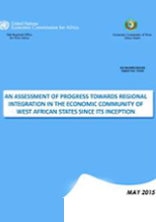Progress towards regional integration in West Africa

ECOWAS is the main regional economic community in West Africa wherein the continental integration process, as advocated by the African Union, should take shape. All fifteen (15) countries of the sub-region are members thereof. The objectives of ECOWAS are to promote cooperation and integration in the economic, social and cultural domains. This is a process which should ultimately lead to an economic and monetary union, through a full integration of the national economies of its Member states, enhanced living standards and greater economic stability. ECOWAS is still at the stage of a free trade area, on the strength of its trade liberalization scheme, and should soon become a customs union.
In view of the celebration of the fortieth anniversary of ECOWAS in 2015, the Sub-Regional Office for West Africa of the Economic Commission for Africa, working within the scope of its 2014-2015 biennial programme, decided to carry out a critical study on the status of regional integration within this sub-region. This study resulted into relevant recommendations to help achieve greater efficiency in the march towards regional integration, as well as contribute to continental integration, as advocated by the African Union (AU).
The main objective of the study is therefore to contribute to improving and to accelerating the regional integration process within the ECOWAS sub-region.
Its specific objectives include: (i) assessing the status of the efforts towards integration efforts made since the establishment of ECOWAS in 1975; (ii) fostering a better understanding of the regional integration process within the ECOWAS sub-region; (iii) identifying the problems and challenges faced by countries and various stakeholders in their march towards sub-regional integration; and (iv) proposing possible solutions to identified problems so as to accelerate the sub-regional integration process.
The study design is based on: (i) a document review and interviews conducted at the ECOWAS Commission and at head offices of inter-governmental organizations in the zone (WAEMU Commission, Secretariat headquarters of the Mano River Union) and of specialized institutions (WAMA, WAMZ); (ii) visits to ECOWAS member countries; (iii) an analysis of the policies and actions initiated by ECOWAS and the real impact of these actions.
The study is in seven parts. The first presents the theoretical underpinnings and practical reasons for the integration process for countries of West Africa.
The second describes the establishment of ECOWAS and its subsequent development.
The third reviews the major common sectoral policies. The relevance of the selected macroeconomic harmonization measures and convergence criteria is also discussed.
The fourth part assesses ECOWAS sectoral polices on the advancement of regional integration and on the economic and social development of Member States.
The fifth part examines the various steps of the sub-regional integration process and their contribution to continental integration. The approach to designing a Composite Regional Integration Index (CRII) is equally presented, as well as preliminary empirical results.
The sixth part analyses the critical challenges faced by ECOWAS.
The seventh part considers the pertinence of the prospect of transforming ECOWAS into a confederate organization.
Finally, recommendations were made for greater efficiency in the progress towards regional integration and for a contribution by ECOWAS to continental integration as advocated by the African Union.